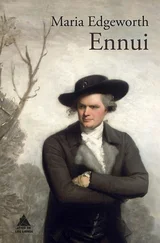Before you be on with the new.’”
Chapter 11. — Difficulties.
––––––––

BEFORE HE LEFT TOWN, Dr. X—— called in Berkeley-square, to see Lady Delacour; he found that she was out of all immediate danger. Miss Portman was sorry that he was obliged to quit her at this time, but she felt the necessity for his going; he was sent for to attend Mr. Horton, an intimate friend of his, a gentleman of great talents, and of the most active benevolence, who had just been seized with a violent fever, in consequence of his exertions in saving the poor inhabitants of a village in his neighbourhood from the effects of a dreadful fire, which broke out in the middle of the night.
Lady Delacour, who heard Dr. X—— giving this account to Belinda, drew back her curtain, and said, “Go this instant, doctor — I am out of all immediate danger, you say; but if I were not — I must die in the course of a few months, you know-and what is my life, compared with the chance of saving your excellent friend! He is of some use in the world — I am of none-go this instant, doctor.”
“What a pity,” said Dr. X— — as he left the room, “that a woman who is capable of so much magnanimity should have wasted her life on petty objects!”
“Her life is not yet at an end — oh, sir, if you could save her!” cried Belinda.
Doctor X—— shook his head; but returning to Belinda, after going half way down stairs, he added, “when you read this paper, you will know all that I can tell you upon the subject.”
Belinda, the moment the doctor was gone, shut herself up in her own room to read the paper which he had given to her. Dr. X—— first stated that he was by no means certain that Lady Delacour really had the complaint which she so much dreaded; but it was impossible for him to decide without farther examination, to which her ladyship could not be prevailed upon to submit. Then he mentioned all that he thought would be most efficacious in mitigating the pain that Lady Delacour might feel, and all that could be done, with the greatest probability of prolonging her life. And he concluded with the following words: “These are all temporizing expedients: according to the usual progress of the disease, Lady Delacour may live a year, or perhaps two.
“It is possible that her life might be saved by a skilful surgeon. By a few words that dropped from her ladyship last night, I apprehend that she has some thoughts of submitting to an operation, which will be attended with much pain and danger, even if she employ the most experienced surgeon in London; but if she put herself, from a vain hope of secrecy, into ignorant hands, she will inevitably destroy herself.”
After reading this paper, Belinda had some faint hopes that Lady Delacour’s life might be saved; but she determined to wait till Dr. X—— should return to town, before she mentioned his opinion to his patient; and she earnestly hoped that no idea of putting herself into ignorant hands would recur to her ladyship.
Lord Delacour, in the morning, when he was sober, retained but a confused idea of the events of the preceding night; but he made an awkwardly good-natured apology to Miss Portman for his intrusion, and for the disturbance he had occasioned, which, he said, must be laid to the blame of Lord Studley’s admirable burgundy. He expressed much concern for Lady Delacour’s terrible accident; but he could not help observing, that if his advice had been taken, the thing could not have happened — that it was the consequence of her ladyship’s self-willedness about the young horses.
“How she got the horses without paying for them, or how she got money to pay for them, I know not,” said his lordship; “for I said I would have nothing to do with the business, and I have kept to my resolution.”
His lordship finished his morning visit to Miss Portman, by observing that “the house would now be very dull for her: that the office of a nurse was ill-suited to so young and beautiful a lady, but that her undertaking it with so much cheerfulness was a proof of a degree of good-nature that was not always to be met with in the young and handsome.”
The manner in which Lord Delacour spoke convinced Belinda that he was in reality attached to his wife, however the fear of being, or of appearing to be, governed by her ladyship might have estranged him from her, and from home. She now saw in him much more good sense, and symptoms of a more amiable character, than his lady had described, or than she ever would allow that he possessed.
The reflections, however, which Miss Portman made upon the miserable life this ill-matched couple led together, did not incline her in favour of marriage in general; great talents on one side, and good-nature on the other, had, in this instance, tended only to make each party unhappy. Matches of interest, convenience, and vanity, she was convinced, diminished instead of increasing happiness. Of domestic felicity she had never, except during her childhood, seen examples — she had, indeed, heard from Dr. X—— descriptions of the happy family of Lady Anne Percival, but she feared to indulge the romantic hope of ever being loved by a man of superior genius and virtue, with a temper and manners suited to her taste. The only person she had seen, who at all answered this description, was Mr. Hervey; and it was firmly fixed in her mind, that he was not a marrying man, and consequently not a man of whom any prudent woman would suffer herself to think with partiality. She could not doubt that he liked her society and conversation; his manner had sometimes expressed more than cold esteem. Lady Delacour had assured her that it expressed love; but Lady Delacour was an imprudent woman in her own conduct, and not scrupulous as to that of others. Belinda was not guided by her opinions of propriety; and now that her ladyship was confined to her bed, and not in a condition to give her either advice or protection, she felt that it was peculiarly incumbent on her to guard, not only her conduct from reproach, but her heart from the hopeless misery of an ill-placed attachment. She examined herself with firm impartiality; she recollected the excessive pain that she had endured, when she first heard Clarence Hervey say, that Belinda Portman was a compound of art and affectation; but this she thought was only the pain of offended pride — of proper pride. She recollected the extreme anxiety she had felt, even within the last four-and-twenty hours, concerning the opinion which he might form of the transaction about the key of the boudoir — but this anxiety she justified to herself; it was due, she thought, to her reputation; it would have been inconsistent with female delicacy to have been indifferent about the suspicions that necessarily arose from the circumstances in which she was placed. Before Belinda had completed her self-examination, Clarence Hervey called to inquire after Lady Delacour. Whilst he spoke of her ladyship, and of his concern for the dreadful accident of which he believed himself to be in a great measure the cause, his manner and language were animated and unaffected; but the moment that this subject was exhausted, he became embarrassed; though he distinctly expressed perfect confidence and esteem for her, he seemed to wish, and yet to be unable, to support the character of a friend, contradistinguished to an admirer. He seemed conscious that he could not, with propriety, advert to the suspicions and jealousy which he had felt the preceding night; for a man who has never declared love would be absurd and impertinent, were he to betray jealousy. Clarence was destitute neither of address nor presence of mind; but an accident happened, when he was just taking leave of Miss Portman, which threw him into utter confusion. It surprised, if it did not confound, Belinda. She had forgotten to ask Dr. X—— for his direction; and as she thought it might be necessary to write to him concerning Lady Delacour’s health, she begged of Mr. Hervey to give it to her. He took a letter out of his pocket, and wrote the direction with a pencil; but as he opened the paper, to tear off the outside, on which he had been writing, a lock of hair dropped out of the letter; he hastily stooped for it, and as he took it up from the ground the lock unfolded. Belinda, though she cast but one involuntary, hasty glance at it, was struck with the beauty of its colour, and its uncommon length. The confusion of Clarence Hervey convinced her that he was extremely interested about the person to whom the hair belonged, and the species of alarm which she had felt at this discovery opened her eyes effectually to the state of her own heart. She was sensible that the sight of a lock of hair, however long, or however beautiful, in the hands of any man but Clarence Hervey, could not possibly have excited any emotion in her mind. “Fortunately,” thought she, “I have discovered that he is attached to another, whilst it is yet in my power to command my affections; and he shall see that I am not so weak as to form any false expectations from what I must now consider as mere common-place flattery.” Belinda was glad that Lady Delacour was not present at the discovery of the lock of hair, as she was aware that she would have rallied her unmercifully upon the occasion; and she rejoiced that she had not been prevailed upon to give Madame la Comtesse de Pomenars a lock of her belle chevelure. She could not help thinking, from the recollection of several minute circumstances, that Clarence Hervey had endeavoured to gain an interest in her affections, and she felt that there would be great impropriety in receiving his ambiguous visits during Lady Delacour’s confinement to her room. She therefore gave orders that Mr. Hervey should not in future be admitted, till her ladyship should again see company. This precaution proved totally superfluous, for Mr. Hervey never called again, during the whole course of Lady Delacour’s confinement, though his servant regularly came every morning with inquiries after her ladyship’s health. She kept her room for about ten days; a confinement to which she submitted with extreme impatience: bodily pain she bore with fortitude, but constraint and ennui she could not endure.
Читать дальше













